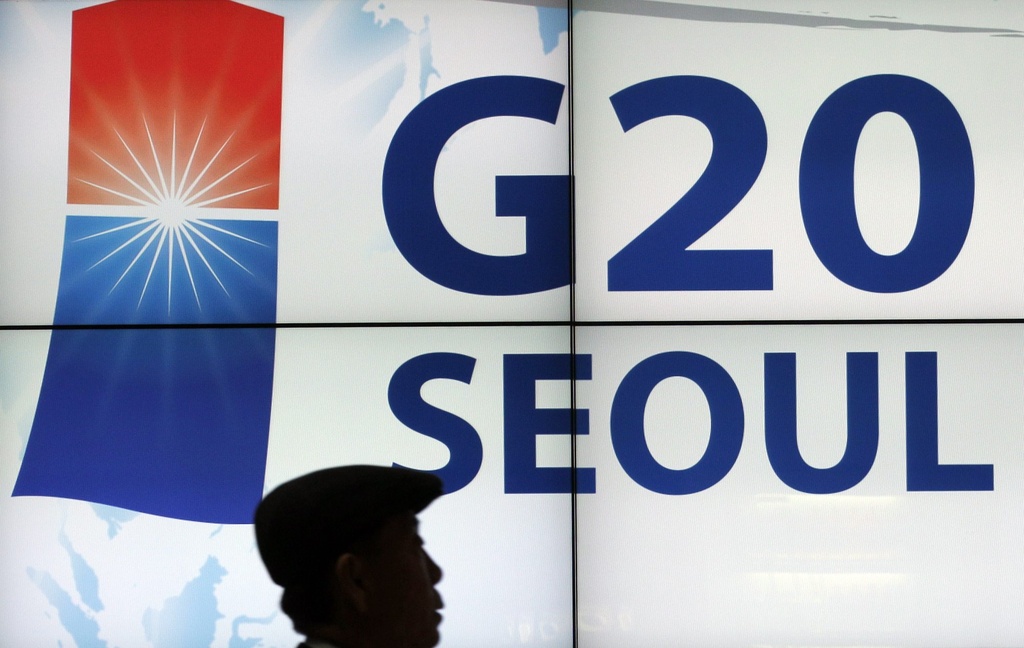G20 meeting makes limited headway

The G20 summit has agreed a broad framework for shoring up the financial system, without offering a detailed solution for dealing with “too big to fail” banks.
Global leaders meeting in Seoul this week were more preoccupied with tackling the problem of volatile currencies and failed to find consensus on how to iron out global trade imbalances around the world.
The 20 most influential world economies gathered in South Korea on Thursday and Friday in an effort to establish coordinated ground rules for dealing with the most pressing global economic concerns.
While it is not yet known how individual countries will translate words into actions, Switzerland would be a net gainer if the main discussion points became reality, according to one Swiss observer.
The export-led economy of Switzerland has suffered from the euro and dollar losing value against the franc in the last year.
This has hit the profits of export companies and forced the Swiss National Bank (SNB) to buy up large amounts of these foreign currencies to prevent the franc from appreciating too quickly. This action has cost the SNB SFr21.2 billion ($21.75 billion) in exchange rate losses so far this year.
Words or actions?
Dieter Ruloff, head of international relations at Zurich University’s department of political science, believes the collective promise of G20 nations not to deliberately devalue their currencies in future could help the Swiss economy.
However, he has serious doubts as to whether the agreement would result in significant changes of policy. “All the countries promised some sort of restraint. But it is not certain if this will be put into action or not,” he told swissinfo.ch.
Ruloff also warned that the impact of such an agreement would not happen overnight and the franc would probably come under renewed pressure from a United States plan to inject billions more dollars into its economy.
“It is extremely unfortunate, but as long as the US economy remains in the doldrums we are not going to see any change for the Swiss franc,” he told swissinfo.ch.
Another strain on the franc is the continued downward pressure on the euro, caused by unsustainable debts in some European countries – notably Greece and Ireland.
Free trade attack
German Chancellor Angela Merkel used the G20 summit to reinforce her objections to using taxpayer funds on a Greek-style bailout of Ireland. But Ruloff believes that Germany did Switzerland a favour by refusing to back plans to level out trade imbalances by introducing caps on surpluses and deficits.
The main bone of contention on this issue lies between the US and China. Mass Chinese exports to the US, fuelled by the low value of the renminbi, have resulted in a massive trade imbalance between the two countries that many observers believe is unsustainable.
Germany’s outright rejection of imposing restrictions on the trade balances of countries will work to Switzerland’s advantage as it enjoys a healthy trade surplus with most economic partners, Ruloff noted.
“This talk about reducing trade surpluses and deficits with caps and ceilings is cloaked speak for a restriction of trade,” he told swissinfo.ch. “Keeping free trade intact is very important for Switzerland. We have reason to be very grateful to Merkel.”
Too big to fail
Strengthening banking regulations to help avoid another financial crisis was rather dwarfed by the currency and trade imbalance issues and the G20 summit. However, leaders did sign off recommendations from the Financial Stability Board (FSB) that go some way towards tackling the problem of banks that are too big to fail.
The proposals to increase the capital reserve buffers of the largest banks, introduce systems to safely unwind failing institutions and impose a strict system to check that they would abide by new measures largely followed moves already announced by Switzerland.
The FSB recommendations allow for individual countries to pick and choose from a menu of measures that would be most suitable for their markets. The task of defining the precise levels of capital reserve buffers and identifying which banks these should apply to will take place next year.
The Swiss Bankers Association declined to comment on the development, but Switzerland’s big two banks – UBS and Credit Suisse – have noted in the past that they could be at a disadvantage if competitors are not burdened with the same level of regulations that they have been saddled with.
The Group of 20 financial ministers and Central Bank governors was established in 1999 – in the wake of the 1997 Asian financial crisis – to analyse and enhance cooperation in matters that affect the global financial system.
The G20 superseded the G33, which in turn superseded the G22. The composition of the council is designed to reflect both economic importance of the participating countries and to include key emerging economies.
The G20 represents about two-thirds of the world’s population, 85% of global gross domestic product and 80% of world trade.
The G20 consists of Argentina, Australia, Brazil, Canada, China, the European Union, France, Germany, India, Indonesia, Italy, Japan, Mexico, Russia, Saudi Arabia, South Africa, South Korea, Turkey, Britain and the United States.
While the Swiss financial sector is the seventh-largest in the world, Switzerland does not have a seat on the G20.
In response to the recent global financial crisis, the behind-the-scenes meetings were ramped up into full-blown summits in 2008.
South Korea holds the revolving presidency in 2010. The meeting in Seoul commissioned the Financial Stability Board (FSB) to draft a package of measures to deal with the “too big to fail” financial problem.
Those recommendations include: enhanced supervisory powers over the financial sector, regulation of the trade in derivatives, reduced dependence on credit ratings agencies and improving accounting standards.
It also tackled the issues of global trade imbalances and currency volatility.

In compliance with the JTI standards
More: SWI swissinfo.ch certified by the Journalism Trust Initiative













You can find an overview of ongoing debates with our journalists here . Please join us!
If you want to start a conversation about a topic raised in this article or want to report factual errors, email us at english@swissinfo.ch.